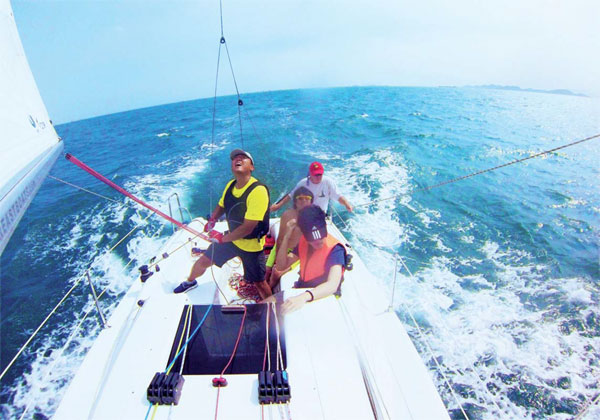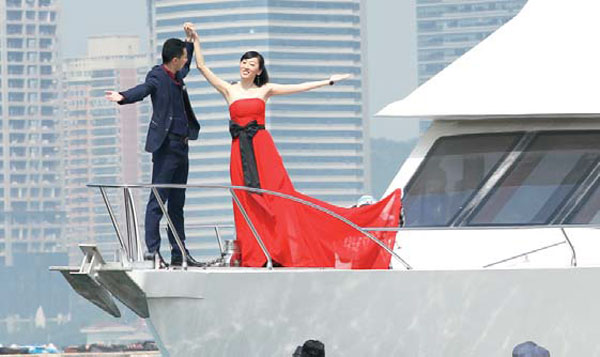Yachting: The tide begins to turn for sailing industry
Updated: 2014-08-15 05:46
By Dong Fangyu(China Daily Europe)
|
|||||||||||
Sport growing in popularity as increasing number look to maritime experience
Summer is the peak time for tourists in Qingdao, a coastal city in Shandong province dubbed China's "sailing capital".
Early morning and sunset are the best times to promenade around the marina at the Qingdao Olympic Sailing Center. The sea breeze is refreshingly cool, and the visitor can spend quality time admiring the different types of boats, from the small - less than 9 meters from bow to stern - to marine mammoths more than 26 meters in length.
|
Sailing has become a popular outdoor team-building exercise in China. Pan Ping / For China Daily |
|
A newlywed couple poses for wedding photos on a yacht at the Qingdao Olympic Sailing Center, Shandong. Zhang Wei / China Daily |
During the day, the area becomes a bustling hive of maritime activity. Newlyweds posed for wedding photos on the decks of yachts, while touts call out to the tourists, "Go yachting, 100 yuan ($16.17) per person." The price may be low, but the downside is that large numbers of people are crowded on a boat for less than 30 minutes.
One yacht broker at the marina says in the aftermath of the 2008 Olympic Games, there are more than 200 yachts docked there, compared with only 20 before.
In 2012, there were about 3,000 yachts in China, but the number is expected to rise to 100,000 by 2020, when the value of the Chinese yachting sector is projected to be 50 billion yuan, according to a 2013 report from the China Cruise & Yacht Industry Association.
Liu Dianfang, chairman of the local yacht industry association in Xiamen, Fujian province says: "The whole industry looks promising. Yet the projected figure of 50 billion yuan is an exaggeration, and China is not ready for it. There is also a cultural difference in China in terms of yachting, so it will take time for Chinese culture to catch up."
Although new marinas and yachting-based infrastructure have sprung up along China's coast since 2008, the yachting culture is still at a nascent stage compared with countries in the West.
Status symbol
For wealthy Chinese business magnates, the marine culture is also a business culture, because ownership of a yacht is seen as a symbol of wealth - one that distinguishes billionaires from millionaires.
The Haier, a Sunseeker 88 that cost more than 50 million yuan, takes pride of place at Qingdao's Olympic Sailing Center. It's one of four yachts owned by Haier Group, a well-known consumer electronic and home appliance company headquartered in Qingdao. All of the company's vessels are used as venues for business receptions.
"Summer is a busy time. I have to prepare receptions on The Haier every two or three days," Mu Bing, the director of the company's yacht club, says, adding that the management fees for the Sunseeker 88, which include regular maintenance and cleaning, are about 1 million yuan per annum, and the insurance costs about 800,000 yuan a year.
According to Hou Haiqing from the Qingdao International Yachting Club, the yachting culture is gaining greater recognition among a growing number of large Chinese big companies, who see sailing as a perfect way to bolster team performance.
"Sailing has become a popular outdoor team-building program for large business because it calls for a strong sense of leadership, teamwork, coping with changing conditions, and a great deal of tactical expertise," says Hou, who has been working in the local yachting sector since 2008.
"Now, many companies have expanded their employees' outward-bound training to the sea. We've organized training sessions for many large companies in China, including Exxon Mobil, Walt Disney, McKinsey and Volkswagen."
Hou's club, the Qingdao International Yachting Club, owns about 50 vessels, including large engine-powered craft and sail boats.
There are more than 450 berths at the Olympic Sailing Center, all managed by Hou's club, which is state-owned, as part of the Qingdao City Construction Investment Group.
At the Olympic marina, annual rental fees for a berth range from 30,000 to 300,000 yuan, depending on the vessel's length and the position of the berth.
Loik Morgant, a veteran yachting consultant based in Qingdao, is a native of Brest, a port in northwestern France. The 45-year-old recalls that in 2005, very few people in Qingdao knew anything about sailing.
"The Chinese government wanted to promote sailing in preparation for the 2008 Olympic Games, so they asked the French Sailing Federation to invite technical and sailing coaches to come to Qingdao. At the time, I was working at the FSF, so I came to Qingdao in 2005."
Morgant and his two partners quickly realized the enormous potential of China's fledgling yachting industry, and established consultancy called CAPE-10, based in the Olympic marina. CAPE-10 - a play on "Captain", which is Morgant's nickname among the local community - is also the only official broker for Beneteau, a leading French yacht manufacturer, in Shandong and the neighboring provinces.
"At the time, there were very few dealers and consultants. We were one of the first foreign brands to establish an office in Qingdao in 2009," Morgant says, adding that the industry boomed in the wake of Olympics and lot of large boats arrived in Qingdao.
Corporate entertainment
According to Morgant, most yacht buyers are in sectors such as real estate, finance and transportation, and use their vessels to entertain their clients. "The industry is developing so rapidly. New marinas are built in one to three years, and the sales revenue from boats is promising. However, despite all these factors, training and industry knowledge lag behind other countries," he says.
"At first, my worry was that everyone wanted to buy big boats fitted the latest high-tech equipment. One person asked me: 'What is the biggest boat in the marina? I want a bigger one.' Another wanted to know if he could buy a yacht with a large table in the center so he could invite 30 guests to dinner on the boat," he recalls.
"We were asked a lot of crazy questions. It's easy to sell a product to those who know little about yachts, and we are trying to adapt to the Chinese customers, but not simply pander to their whims. Our aim is not just to sell bigger and bigger boats," he says, referring to the company's desire to sell customers a boat that's right for them.
According to Morgant, the market has slowed this year because the government's well-publicized austerity and anti-corruption campaigns have made customers reluctant to appear ostentatious.
"It's good for every one to calm down because it will allow the industry to provide a better service, and give people time to learn about sailing," he says.
Nick Liu, marketing manager of Qingdao Furi Yachts and Marina Club, says that as a greater number of foreign brands gain a foothold in China, the maritme market is becoming more fragmented.
Liu's club, which owns an Azimut Flybridge 82 that is docked at the Olympic Sailing Center, is an official broker for Azimut, Italy's leading yacht maker.
"With regard to individual needs and interests, buyers now have more options, and are becoming more rational."
"Some choose to buy a fishing yacht, while others prefer a racing one, and still others want to own a leisure craft for entertainment. It's just like when cars first became widely available in China in the 1980s. At the beginning, owning a car - no matter what brand it was - was a status symbol, but nowadays it's a totally different situation," he says.
Liu says that compared with motorboats, sailboats are becoming more popular with Chinese buyers.
"People are beginning to understand that yachts are more sporty, more environmentally friendly, more economical, and they can undertake a voyage round the world."
"Many wealthy buyers are beginning to consider catamarans, rather than a large motorboats, because they are multifunctional. They can be as spacious as motor yachts, and are designed for sailing."
Misleading perception
Xie Boyi, a member of the National Yacht Development Experts' Committee, says there is a misleading perception in China that yachting is just a luxury activity for the super rich.
That view is echoed by Liu Dianfang, chairman of Xiamen's Yacht Industry Association, who says: "If you look at the global yacht market, 95 percent of consumption is small- and medium-sized vessels. More specifically, of that figure, about 85 percent of the yachts are less than 11 meters in length, and are worth less than 1 million yuan."
Per capita yacht ownership remains far below Western levels. In 2012, one in every 430,000 people had a yacht. By contrast in 2008, about one in every nine people in New Zealand owned a yacht; while in Italy the figure was one in every 100, according to the China Cruise & Yacht Industry Association report.
"The property of yachts is more about private ownership, like a car or a house, and has architectural and artistic attributes."
"Very often, they are customized in terms of decoration and design," Xie says.
"It is a pity that a well-built sailing yacht or motor yachts are used as tourist boats with too many people squeezed together onboard."
"Many tourists will only have one experience of sailing and the yachting culture shouldn't be promoted like this," he says.
The China Cruise & Yacht Industry Association says a yacht priced at between 500,000 to 1 million yuan can be chartered for between 500 to 800 yuan an hour.
That means a couple of friends could pay 3,000 yuan to charter a yacht for half a day, a reasonable sum for white-collar workers, leading industry insiders to believe chartering could become a major driver of yacht purchases in the next decade.
dongfangyu@chinadaily.com.cn
(China Daily European Weekly 08/15/2014 page24)
Today's Top News
British Chinese call for memorial to WWI workers
Pollution control set as priority for APEC meeting
Swimmer nabs silver at Gay Games in the US
China exports to Russia to surge
Chinese economic crime suspects repatriated
Ukraine deaths double in 2 weeks
Sensitive times in the making
Chinese film fans mourn for star
Hot Topics
Lunar probe , China growth forecasts, Emission rules get tougher, China seen through 'colored lens', International board,
Editor's Picks

|

|

|

|

|

|







